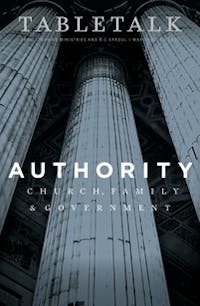
Request your free, three-month trial to Tabletalk magazine. You’ll receive the print issue monthly and gain immediate digital access to decades of archives. This trial is risk-free. No credit card required.
Try Tabletalk NowAlready receive Tabletalk magazine every month?
Verify your email address to gain unlimited access.
Do you want to know how Christians can influence the culture? How to have a strong family? Do you want to know the meaning of your life? Do you want to know how authority works? Then attend to the Reformation doctrine of vocation.
This strangely neglected doctrine has to do with how God providentially governs the world of human beings. It also constitutes the theology of the Christian life.
The doctrine of vocation, a term that is just the Latin word for “calling,” deals with how God works through human beings to bestow His gifts. God gives us this day our daily bread by means of the farmer, the baker, the cooks, and the lady at the check-out counter. He creates new life — the most amazing miracle of all — by means of mothers and fathers. He protects us by means of police officers, firemen, and our military. He creates beauty through artists. He heals by working through doctors, nurses, and others whom He has gifted, equipped, and called to the medical professions. He proclaims His Word, administers His sacraments, and cares for His sheep through the calling of pastors.
Luther called vocation a “mask of God.” He said that God milks the cows by means of the milkmaid. We see a menial worker and may even be so presumptuous to look down upon her, but behind that humble façade looms God Himself, providing milk for His children.
And we too are masks of God in all of our multiple callings. We have callings in the church (pastors, elders, choir members, parishioners); in the state (rulers, subjects, voters); in the workplace (employer, employee, factory worker, milkmaid, businessman); and in the family (husband and wife; father and mother; child; grandparent).
Before God, all vocations are equal. Our standing before Him is based solely on Jesus Christ, our sin-bearer, our redeemer, and our righteousness. But as we receive God’s grace in Christ, we are then sent into the world to live out our faith in the daily routines of ordinary life — that is, in our vocations.
The purpose of every vocation is to love and serve our neighbor. God does not need our good works, commented Luther, but our neighbor does. In our vocations we encounter specific neighbors whom we are to love and serve through the work of that calling. Husbands and wives are to love and serve each other; parents love and serve their kids; office and factory workers love and serve their customers; rulers love and serve their subjects; pastors and congregations are to love and serve each other. And God is in it all.
Of course, we also sin in vocation — insisting on being served rather than serving; loving ourselves rather than our neighbors; misusing the gifts and the calling God Himself has given us — we come to Him on Sunday mornings in repentance, hearing God’s Word, being built up in our faith. Whereupon God sends us back into our callings, with all of their trials and tribulations, for that faith to bear fruit in love, service, and sanctification.
One problem people often have with vocation — that of others, as well as their own — is that some vocations exercise authority. “There is no authority except from God,” says the apostle Paul (Rom. 13:1). Strictly speaking, only God has authority in Himself. But as Romans 13 goes on to say, God exercises His authority through the agency of lawful government, punishing wrongdoers and rewarding those who do well, so as to make civil order possible.
Similarly, fathers have an authority in the family because of the fatherhood of God. In marriage, Christ is hidden in the office of the husband. In the church, a pastor wields the authority of God’s Word.
This authority is not inherent in the person but rather comes by virtue of the office. But authority in vocation is not just a matter of who gets to boss whom. Authority in vocation must be exercised in love and service to the neighbor (see Matt. 20:26–27). The ruler is described as “God’s servant” (Rom. 13:4). Masters are reminded that they too have a master (Eph. 6:9).
The vocation of marriage entails only one neighbor to love and serve: one’s spouse. Christ is hidden in marriage. Thus, wives are to “submit to your own husbands, as to the Lord” (Eph. 5:22). But note how husbands are to exercise this authority: “Husbands, love your wives, as Christ loved the church and gave himself up for her” (v. 25). Wives are indeed to submit, but husbands, like Christ, are to give themselves up for their wives.
This self-sacrificial love is the foundation of Christian authority. It allows for no tyranny. A husband is not called to hurt, use, or brutalize his wife. Rather, he is called to love and serve her by giving himself up for her sanctification (v. 26). Parents are not called to harm their children or even provoke them to anger, but rather to “bring them up in the discipline and instruction of the Lord” (6:4).
Earthly rulers too are to exercise their office in love and service to their neighbors, that is, to their subjects. According to Romans 13, earthly rulers are called to protect the innocent and punish wrongdoers. A ruler who protects wrongdoers and punishes the innocent has no calling — and thus no authority — from God.
God is hidden in vocations that bear authority. But that puts the pressure on the human being who exercises that authority to act with God’s justice and grace.
